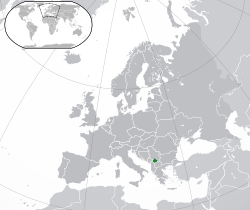Country code
The International Telecommunication Union (ITU) has assigned country code 383 to Kosovo by an agreement between the authorities of Kosovo and Serbia in an EU-led dialogue. [1] Its dialing code was initially expected to become effective on 1 January 2015, but it was postponed to the finalization of the agreement in late August 2015. [2] With the agreement of the Administration of the Republic of Serbia, the Director of TSB has assigned the international codes to Kosovo. [3] Kosovo is represented in ITU as Kosovo* which the designation is without prejudice to positions on status, and is in line with UNSCR 1244 and the ICJ Opinion on the Kosovo declaration of independence. [4]
History
Following the breakup of the SFR Yugoslavia in 1992, which used country code 38, Kosovo used the code 381, which was granted to FR Yugoslavia and later used by Serbia. The code was used for fixed line telephone services, whereas for mobile phone networks, it used either the Monaco code 377 or the Slovenian code 386. [5] The new country code, 383, began service in early 2017.
Reactions to 383 code allocation
The International Telecommunication Union "will not recognize Kosovo's independence", quote daily Koha Ditore , "as ITU will include the footnote on Kosovo" in the technical annexes. Kosovo's NISMA party leader Fatmir Limaj was quoted by KosovaPress agency to have said that with the agreement reached in Brussels, the Kosovo government "allowed the Serbian operator to work in Kosovo". [6] Vice chairman of Kosovo's Vetëvendosje party, Shpend Ahmeti claimed that the agreement favored Serbia. "Telephone calls between cities in Serbia and cities in Kosovo will be treated as local calls. Serbia will preserve its assets in Kosovo and it will also have a license for Serb operators within Kosovo. For these favors, Serbia will allow Kosovo to have its own country code." [7]
This page is based on this
Wikipedia article Text is available under the
CC BY-SA 4.0 license; additional terms may apply.
Images, videos and audio are available under their respective licenses.
